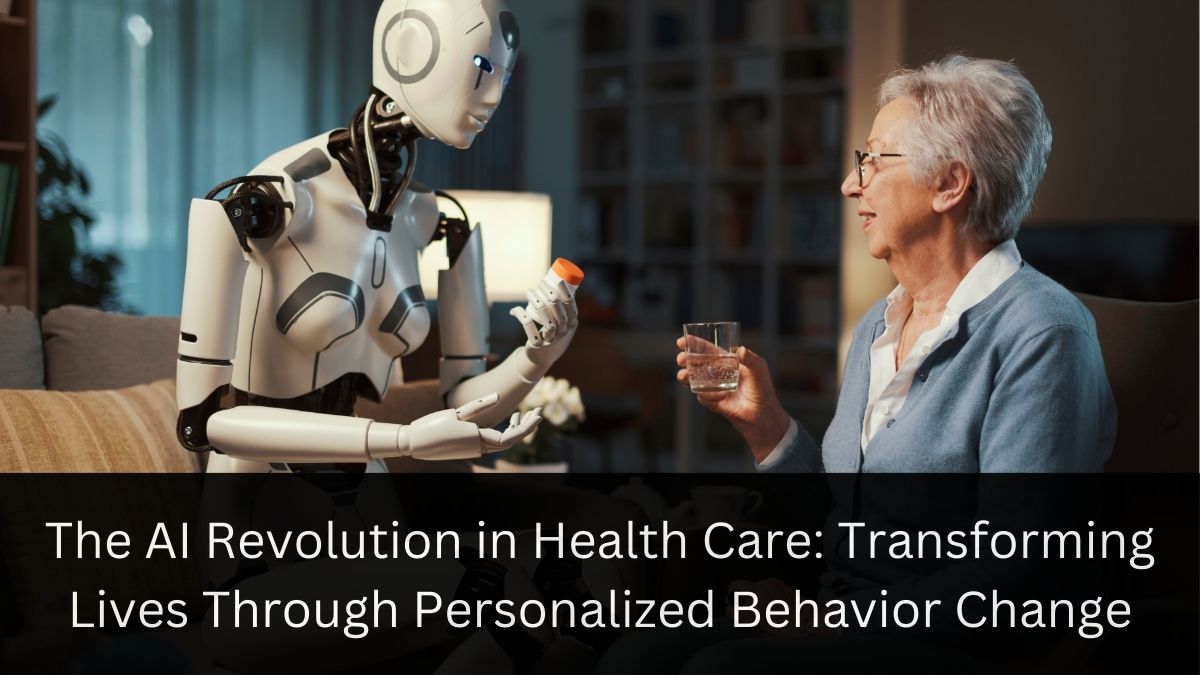AI
The AI Revolution in Health Care: Transforming Lives Through Personalized Behavior Change

In an era where chronic diseases affect millions and healthcare costs continue to soar, a groundbreaking solution is emerging at the intersection of artificial intelligence and personal health management. This innovative approach promises to revolutionize how we prevent, manage, and treat chronic conditions by focusing on the cornerstone of well-being: our daily behaviors.
The Chronic Disease Crisis
The United States faces a daunting health challenge. A staggering 129 million Americans grapple with at least one major chronic disease. These conditions, both physical and mental, consume a whopping 90% of the nation’s annual $4.1 trillion healthcare expenditure. The outlook is grim, with projections indicating this burden will only intensify in the coming years.
But amidst this crisis, a beacon of hope shines through – the power of behavior change.
Behavior Change: The Miracle Drug We’ve Overlooked
While medical treatments and genetic factors play crucial roles in health outcomes, the impact of our daily habits cannot be overstated. Sleep patterns, dietary choices, physical activity, stress management, and social connections form the bedrock of our well-being. These five foundational behaviors have the potential to prevent disease onset and optimize treatment efficacy.
However, changing ingrained habits is notoriously challenging. This is where artificial intelligence steps in, offering a personalized approach to behavior modification that could transform healthcare as we know it.
Enter AI: The Personalized Health Coach
Imagine having a health coach that knows you intimately – your preferences, routines, medical history, and even your momentary moods. This coach is available 24/7, offering real-time guidance tailored specifically to you. This isn’t a far-fetched fantasy; it’s the promise of AI-driven health management.
How It Works
AI health coaches, like the one being developed by Thrive AI Health, leverage vast amounts of data to create hyper-personalized recommendations. These systems are trained on:
- Peer-reviewed scientific literature
- Established behavior change methodologies
- Individual biometric and medical data
- Personal preferences and daily patterns
By synthesizing this information, AI can offer precise, actionable advice that resonates with each user’s unique circumstances.
Real-World Applications
Let’s consider a busy professional managing diabetes. Traditionally, they might struggle to balance blood sugar levels amidst a hectic schedule. An AI health coach could:
- Send timely medication reminders
- Suggest quick, diabetes-friendly meal options
- Encourage brief exercise breaks tailored to their daily routine
- Adjust recommendations based on real-time blood glucose readings
This level of personalization goes far beyond generic health tips, making it easier for individuals to implement lasting changes.
Democratizing Health and Addressing Inequities
One of the most promising aspects of AI-driven health coaching is its potential to address health inequities. Currently, access to personalized health guidance – such as nutritionists, personal trainers, and life coaches – is often limited to those with significant financial resources.
AI could level the playing field by making tailored health advice accessible to a broader population. For instance, it could provide budget-friendly, culturally appropriate meal suggestions or recommend exercises that don’t require expensive equipment or gym memberships.
Beyond Physical Health: Nurturing Mental Well-being
The impact of AI health coaches extends beyond physical health. By helping individuals manage stress, improve sleep quality, and foster social connections, these tools can significantly boost mental and emotional well-being.
When we’re well-rested, properly nourished, and less stressed, we’re better equipped to make choices that support our long-term happiness and health. AI coaches can help break the cycle of stress-induced poor choices, guiding users towards habits that nourish both body and mind.
The Future of Healthcare: AI as Critical Infrastructure
As we look to the future, AI has the potential to become a fundamental part of our healthcare system. Just as the New Deal built physical infrastructure to transform the nation, AI could serve as the digital infrastructure for a more effective, proactive approach to health management.
This shift could redefine how we think about healthcare, moving from a model focused on treating illness to one centered on maintaining wellness. By providing ongoing support between doctor visits, AI coaches could help prevent the onset of chronic conditions and improve the management of existing ones.
Challenges and Considerations
While the potential of AI in healthcare is immense, it’s crucial to address several key challenges:
- Privacy and Data Security: Safeguarding personal health data is paramount.
- Regulatory Framework: Policies must be developed to ensure the safety and efficacy of AI health tools.
- Integration with Existing Healthcare Systems: AI coaches should complement, not replace, traditional medical care.
- Accessibility: Efforts must be made to ensure these tools are available to all, regardless of technological literacy or economic status.
Conclusion: A Call for Collaboration
The vision of AI-driven personalized health coaching is within reach, but achieving it requires a collaborative effort. Policymakers, healthcare providers, tech companies, and individuals all have roles to play in shaping this future.
As we stand on the brink of this healthcare revolution, we must embrace the potential of AI while thoughtfully addressing its challenges. By doing so, we can create a future where technology empowers each of us to lead healthier, happier lives.
The journey to better health begins with small steps. With AI as our guide, those steps can become a transformative path to well-being for millions around the world.
